Labor leaders commit to fight against racism
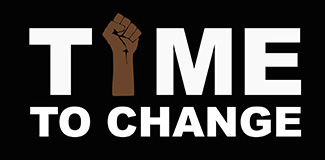 Working people have had enough, AFL-CIO President Richard Trumka said during a Zoom teleconference with other Labor leaders on June 3 in response to the murder of George Floyd, during which union leaders pledged to continue the fight to root out systemic racism and inequality in the U.S.
Working people have had enough, AFL-CIO President Richard Trumka said during a Zoom teleconference with other Labor leaders on June 3 in response to the murder of George Floyd, during which union leaders pledged to continue the fight to root out systemic racism and inequality in the U.S.
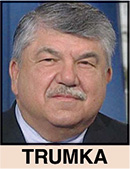 “The list of victims, the list of grievances is long,” Trumka said. “Racism places an insidious role in the daily lives of all working people of color and this is a Labor issue because it is a workplace issue, it is a community issue, and unions are the community.
“The list of victims, the list of grievances is long,” Trumka said. “Racism places an insidious role in the daily lives of all working people of color and this is a Labor issue because it is a workplace issue, it is a community issue, and unions are the community.
“This week so many working people said, ‘We’ve had enough,’ enough of the systematic racism, enough of the police violence. Many of us took to the streets. In Minneapolis entire communities rose up in protest and the Labor Movement was proud to be part of that rising. We saw unionized bus drivers refuse to transport protesters to jail. We saw our Labor bodies organize community networks to support peaceful protests.
“The Minnesota AFL-CIO rightly called for the resignation of the Minneapolis police union president who is enflaming community tensions instead of dealing with them. Our Movement did this because protesting racial brutality, whether at the hands of a police officer or a neighbor or an employer is not only a righteous cause, it’s our responsibility. It’s incumbent on each and every one of us.”
Quoting the famous African American union leader A. Philip Randolph, Trumka concluded, “‘Justice is never given, it’s exacted, and freedom is never a final fact but a continuing, evolving process.’
“Black lives matter,” Trumka said. “Black. Lives. Matter.”
MOST CHALLENGING MOMENT IN OUR LIFETIME
“I was a teenager living in Cleveland, Ohio during the unrest in 1968,” said Lee Saunders, president of the American Federation of State County and Municipal Employees (AFSCME). “I was working in New York City on Sept. 11, 2001. But this is probably the most challenging moment the nation has ever faced in our lifetime.
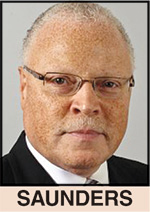 “We’ve lost 100,000 of our people to a deadly virus, the worst public health crisis in a century. The economy is in a state of collapse with more than 40 million people out of work, terrified they won’t be able to provide for their families. And now the murder of George Floyd has exposed entrenched, systemic racial injustices that have been a part of American life since the very beginning.
“We’ve lost 100,000 of our people to a deadly virus, the worst public health crisis in a century. The economy is in a state of collapse with more than 40 million people out of work, terrified they won’t be able to provide for their families. And now the murder of George Floyd has exposed entrenched, systemic racial injustices that have been a part of American life since the very beginning.
“All these crises are deeply intertwined,” Saunders said. “We can’t solve one if we ignore the others. The pulsating rage we’ve seen on the streets of American cities is the product of a failure of so many elected leaders to address these crises, to respond to our needs, to hear the anguished voices of our most vulnerable and marginalized people. We must continue to channel our anger and our energy toward constructive change. We must register to vote. We must vote. We must talk to our families and friends and neighbors and co-workers about everything that is at stake. We must educate and organize and mobilize every community across this country. We must defeat every politician who stokes racial divisions and tries to turn Americans against one another. We must tear down, be peaceful means, through the democratic process, the system that has enabled their rise to power.”
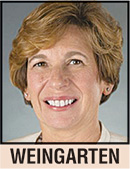 INTERTWINED CRISES
INTERTWINED CRISES
“We have three crises right now,” said Randi Weingarten, president of the American Federation of Teachers.
“One is a public health crisis.
“Two is an economic crisis, caused in part by the public health crisis.
“Three is a long-term justice crisis that in front of our eyes we saw… a police officer, accompanied by other police officers, murdering a black man who said ‘I can’t breathe.’ The video makes clear what that conduct was and how heinous and antithetical to human nature that conduct was.
“These three crises – a pandemic, unemployment and injustice – have all been made worse by a president who refuses to listen and learn,” Weingarten said, referring to President Donald Trump.
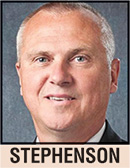 WE NEED A LEADER
WE NEED A LEADER
Lonnie Stephenson, president of the International Brotherhood of Electrical Workers (IBEW) said: “We need a leader that will listen to those voices” of Black and brown people who have been degraded for decades “and do something about it – instead of having a photo-op and bragging about his right to bring in our military against our citizens.
“I don’t believe the action by the four Minneapolis police officers represent police officers at all. The vast majority of police officers in this country are good people. My stepson is a police officer in Illinois. We’ve got to make sure that we recognize the officers who are out there doing the right thing every day, but at the same time, we’ve got to call out the officers who are not.”
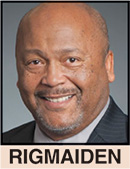 A BROADER PROBLEM
A BROADER PROBLEM
“Our current situation is part of a broader problem”, said Ken Rigmaiden, president of the International Union of Painters and Allied Trades.
“The U.S. is built on an economic system that thrives on dividing us by race, gender, sexual orientation, and immigration status. The wealthy thrive while we struggle. The only path to a just and more equitable society is through struggle.”
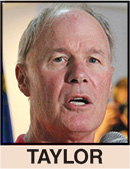 As part of Organized Labor’s effort to address systemic racism, he said, unions must make a concerted effort to promote, push forward, and elect leaders of color.
As part of Organized Labor’s effort to address systemic racism, he said, unions must make a concerted effort to promote, push forward, and elect leaders of color.
“This is not normal, except it is,” said UNITE HERE President D. Taylor, whose membership is majority people of color. “I grew up in the South. The only difference between now and then is that people have video tapes. This has been going on for a long time. This is nothing new. Racism is as old as America has been around.”


Leave a Reply